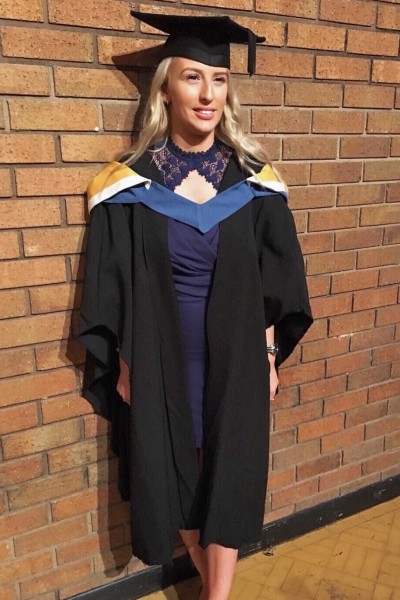As 2020 draws to a close, we are acknowledging and celebrating the dedication of our graduates working in the NHS. We asked five BU alumni to reflect on the past year, and to tell us their hopes for the year ahead. The interviews also form part of BU’s celebration of the International Year of the Nurse/Midwife, designated by the World Health Organisation to mark the 200th anniversary of Florence Nightingale’s birth.
Abbie Barnes
Abbie graduated with a BSc (Hons) in Psychology in 2017 and now works as an Assistant Psychologist for an NHS and Social Care Partnership Trust.
How did your job role change as a result of the pandemic?
I started my role a couple of weeks before lockdown was announced. I transitioned to working remotely full time, whilst trying to get to know the team and my new role. I supported the development and implementation of a psychological crisis response for those being discharged from inpatient units unexpectedly due to the Covid-19 outbreak. Instead of seeing patients face-to-face, we adjusted to telephone and video contact which was a big challenge. The pandemic has understandably had a significant impact upon mental health and this was evident amongst my own caseload of patients. The therapeutic work had to consider the implications of the pandemic on people, the grief some experienced, physical health concerns and feelings of isolation. I also supported a quick-response research project, exploring patients’ and clinicians’ experience of using video/telephone therapy to help guide and support service provision.
What were the biggest challenges of the past year – professionally or personally?
A big challenge for me this year was adjusting to a new role amidst the pandemic. I was learning and trying to build relationships with the team remotely whilst we were all facing unprecedented
circumstances with ever-changing guidance. I also found adapting to video/telephone therapy a challenge, as it disrupts the usual patient/therapist relationship due to the lack of non-verbal cues and not being physically present in a room with somebody. A big challenge for me personally was remaining mindful of my own mental health in order to best support my patients and colleagues. It was important to remind myself that I was also experiencing a pandemic and needed to be kinder to myself. In doing so I was able to be a more effective NHS staff member.
What, if any, were the high points or moments of celebration?
A high, yet difficult, point for me was doing a telephone session with a patient who had Covid-19 and listening to them struggle for breath to such an extent that I had to take urgent action and call an ambulance on their behalf. It was a difficult phone call as I was trying to manage the patient's and my own fears/assumptions of going into hospital in order to ensure they received the necessary care. The high point came when we spoke a few weeks later and the patient had recovered from Covid and was back home with their family.
How have the challenges of this year compared with the rest of your career to date?
The challenges this year have varied significantly to the rest of my career. Although working within mental health you are aware of how to support those struggling, it is different when it is such an unexpected and wide-reaching situation that is affecting each and every one of us. It was also more challenging as it highlighted the demand and lack of resources the NHS suffers from and when staff need support and protection in order to care for others it can vary across regions, sectors and demographics.
As 2020 draws to a close, what has this year taught you and what are your hopes for the coming year?
This year has taught me to be grateful for what I have, including my health and the importance of connection for us all. The pandemic has pulled us away from one another, yet is a situation where we need to be together and I feel fortunate that I have the opportunity to be that support and connection for others. My hopes for 2021 are to return to face-to-face therapy in order to meet the patients I have started sessions with and support them as we all try to navigate the ever-changing times.
